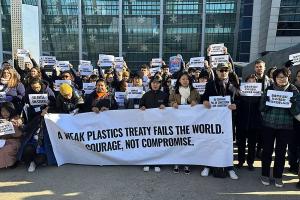
Understanding the Need for a Global Plastic Pollution Treaty
Plastic pollution has emerged as one of the most pressing environmental crises of our time. Every year, over 450 million tonnes of plastic are produced worldwide—an amount expected to double by 2045 if current trends continue. Despite the staggering scale of this issue, only about 9% of plastic ever produced is recycled, with the remainder landfilled, incinerated, or escaping into our environment. This unchecked growth has led to plastic infiltrating the deepest oceans, the remotest mountains, and even inside human bodies, raising concerns about long-term health and ecological impacts.
In response to the global nature of plastic pollution, international efforts have gained momentum. The United Nations Environmental Assembly (UNEA) in 2022 called for a legally binding treaty aimed at ending plastic pollution, acknowledging that no single country can tackle this challenge alone. This initiative highlights the importance of a concerted, multinational approach to regulate production, manage waste, and address the chemicals involved in plastics.
The Role of International Negotiations in Developing a Binding Agreement
Representatives from 175 countries are scheduled to meet in Geneva, Switzerland, to negotiate the final details of this historic treaty. This meeting, known as INC-5.2, follows a failed attempt in Busan, South Korea, where critical issues such as production limits, chemical regulation, and financial mechanisms remained unresolved. The stakes are high: the success of this treaty depends on bridging countries’ political divides and establishing strong, enforceable measures to curb plastic production and waste.
Scientists and environmental advocates, including Bangor University researchers, emphasize that effective action must address every stage of the plastics lifecycle—from manufacturing to disposal. The challenge lies in achieving consensus among nations with differing economic interests and industry influences, particularly from petrochemical lobbyists pushing for weaker regulations.
Bangor University’s Contribution to Addressing Plastic Pollution
Bangor University, based in the UK, has been actively involved in research and advocacy surrounding plastic pollution. Through its Marine Pollution group and environmental science programs, Bangor researchers contribute valuable insights into how plastics impact ecosystems and human health. The university also collaborates with international bodies to inform policy decisions, emphasizing the importance of science-backed regulation.
Moreover, Bangor University champions local and global efforts to reduce plastic waste, fostering education and innovation in sustainable materials and waste management practices. Its involvement underscores the critical role academic institutions play in shaping policy and raising awareness about environmental crises like plastic pollution.
Challenges Facing the Formation of an Effective Plastic Pollution Treaty
Despite widespread support, negotiations are hampered by significant disagreements. Some nations, particularly those with substantial petrochemical industries, advocate for voluntary measures and recycling-focused approaches, fearing stringent regulations could harm their economies. Others, aligned with environmental groups like the High Ambition Coalition, push for ambitious targets, including caps on plastic production and strict chemical regulation.
Industry lobbying has also influenced negotiations, with large delegations advocating for weaker commitments that may undermine the treaty’s effectiveness. The imbalance of representation—where petrochemical industries outnumber scientific and indigenous voices—raises concerns about the treaty’s capacity to deliver meaningful change.
The Importance of Leadership and Determined Negotiation
As the Geneva negotiations approach, the path to a comprehensive treaty hinges on political will and international cooperation. Ambitious countries must stand firm against watered-down proposals and prioritize environmental integrity. It is essential to craft provisions that address chemicals, production limits, and funding mechanisms, ensuring the treaty’s long-term impact.
Bangor University’s researchers and environmental experts advocate for transparency, science-based policies, and inclusive participation to ensure that the treaty effectively counters plastic pollution. Effective leadership can turn the current crossroads into a milestone for environmental protection.
What Impact Could the Treaty Have?
If successfully negotiated, a binding global treaty could significantly reduce plastic production and pollution. This would entail regulating chemicals used in plastics, setting caps on manufacturing, and establishing financial mechanisms to support waste management in developing countries. Such measures could prevent the entry of millions of tonnes of plastics into oceans and ecosystems each year and mitigate long-term health risks associated with microplastics.
Furthermore, a robust treaty would bolster international cooperation, encouraging innovations in biodegradable materials, circular economies, and sustainable production practices. Bangor University’s academic programs and research initiatives will continue to contribute to these efforts by fostering expertise in environmental science and policy development.
How Can Countries Ensure the Success of the Plastic Pollution Treaty?
To maximize the treaty’s effectiveness, countries need to:
- Prioritize science-based standards over industry lobbying.
- Ensure equitable representation of vulnerable and indigenous communities.
- Establish transparent monitoring and enforcement mechanisms.
- Secure adequate funding for waste management infrastructure, especially in developing nations.
- Agree on clear definitions, scope, and commitments within the treaty framework.
Academic institutions like Bangor University can support these goals by providing expert analysis, educating future policymakers, and advocating for evidence-based environmental legislation.
Conclusion: Seizing the Moment for a Sustainable Future
The window to craft a meaningful global plastics treaty is narrowing, and the stakes could not be higher. It is a rare opportunity to address a crisis that affects ecological systems, climate, and human health worldwide. As negotiations continue, the role of committed nations, informed by scientific expertise—such as that from Bangor University—will determine whether this moment transforms into lasting environmental progress or slips away into compromise.
For stakeholders, policymakers, and citizens alike, staying informed and advocating for strong international commitments is essential. The future of our planet’s health may depend on our collective ability to seize this pivotal moment and implement a comprehensive, enforceable, and equitable treaty to reduce plastic pollution globally.
Interested in learning how academic research influences environmental policy? Explore Bangor University’s environmental programs and research initiatives.

